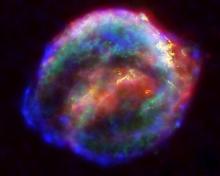The question of how the universe came to be has always been a hot topic for clerics and scientists alike. It's pretty much the biggest unanswered 'why?' out there, yet there are loads of smaller mysteries about the origins of our more local astronomical surroundings. We think all things began as gas and space dust, but how did solar systems form out of the amorphous chaos? How did our revolving planet and its gravitational dance with its neighbors come about?
Scientists may have a better idea now than ever before. It was previously known that suns and planets can arise when gas and dust swirl together in a huge disk, but something didn't quite add up when that model was simulated with computers. Scientists had found aluminum-26 in asteroids within our solar system, an element which led to the discovery that our system is about 4.5 billion years old, but which also confounded the model of Sol's creation. The aluminum-26 seemed to have enriched the system's birth cloud within only 20,000 years--an alarmingly fast rate when compared with simulations of the development of our planetary surroundings.
Now, a new study conducted by Matthias Gritschneder of the University of California, Santa Cruz suggests that a supernova may be responsible for the formation of our solar system. A supernova exploding 15 light years from the cold cloud of gas that was our proto-solar-system would explain the sudden enrichment of the cloud with the radioactive element. The supernova's shockwave would also trigger the collapsing of the cloud, meaning that the trajectory from cloud to solar system was almost definitely because of a nearby explosion.
Other scientists agree with Gritschneder's findings. Alan Boss of the Carnegie Institution for Science in Washington, DC came to the same conclusion from a different starting point and with different math. The fact that there have been two independent studies with similar results strengthens the credibility of the supernova theory. Planetary scientist Fred Ciesla of the University of Chicago also agrees with the hypothesis, although he brings up the fact that there are still loose ends in the theory such as the presence of iron-60. But hey--we may not have the numbers down perfectly, but at least we've got a clearer picture of the birth of this here system of ours.
It's kind of poetic, when you think about it. An aging massive star dies, but sends out a shockwave that triggers the creation of our sun and, eventually, life as we know it. We were brought to being by an explosion bigger than we can imagine. Pretty awesome.
